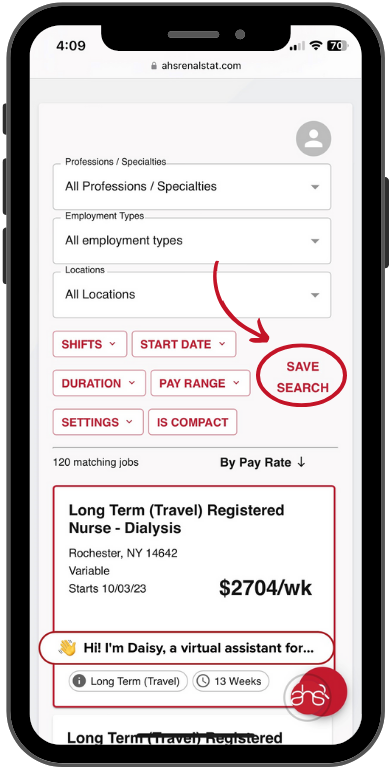Kelly Burleson, Marketing Director
AHS RenalStat
www.ahsrenalstat.com
As a dialysis staffing agency, we work with Dialysis RNs and CDTs on a daily basis. We talk them through the interview process, place them – and more times than not, place them again. There is a lot that goes into finding a “good fit” for a dialysis professional. But once you find that dream job, how do you keep it? Or better yet, what are some steps you can take to grow with the company? For veteran dialysis professionals, this might be easy. But what about new graduates?
Recently, we asked a dialysis RN to help us answer some of these questions. We wanted to get a veteran RNs perspective on what new grads should know when entering the dialysis industry. So we called on John Long, RN and Program Director at Stanford-Brown College.
And this is what he had to say…
So graduation day is here, and you’re a new Dialysis Technician (or Dialysis Nurse) ready to set the world on fire and show them all how it’s supposed to be done. You’re fresh out of school, have the latest information packed tightly into your head, and can’t wait to start working with patients.
Not to rain on your parade, but the world is a big place, and dialysis is a small profession. Unless you work in Texas or California, clinics are few and far between, and running into your new workplace with the attitude that you’re “the best that’s ever been” is just going to alienate you from your co-workers fast, and make you miserable for a long time. In San Antonio we have 56 clinics within 50 miles, and most of us know each other very well, so even then it’s easy to get a reputation of being “difficult to work with” or “hard to train” pretty quickly.
And you really don’t need that.
So what’s the best advice that this 32 year dialysis nurse can give the new graduates? I did a survey of the staff here at Sanford-Brown College where I teach, and got some interesting answers, so let’s look at them first.
From Nicole, the receptionist: “Never enter a job with the mindset “I know it all.” Always have an open mind when opportunity arises to further your skills and knowledge by learning. It will make for a wonderful and pleasurable career.”
From Mary in Career Services: “Follow through. Make commitments, not promises. Get the experience. And most of all, keep an open mind. Most graduates do not see themselves as entry level; they want the big salary that comes from 10-15 years of experience.
From Sabrina in Career Services: “Ask yourself ‘How bad do I want this job’? Set realistic goals and obtain the right equipment: a great resume, mock interview experience, a good cover letter, portfolio. Then research the company for facts to wow them during the interview. Ask the appropriate questions, follow up with a thank you letter or email as soon as possible, and more importantly, ASK FOR THE JOB. It makes a world of difference when entering the workforce and obtaining a job versus folks that would lack a few or all of these things.”
From Sue, Program Director and one of the longer-term employees here: “Don’t fear or fight change. What applies today may not apply tomorrow. Think of change as a growing experience which will always be part of your career.”
From Vangie, Medical Instructor: “Customer service will make or break any business. Always remember to be kind to patients no matter how ugly the patient is behaving. Pain changes the nicest person and also the frustration that comes from chronic illness.”
And from Ken, Academic Instructor : Stay current on all your training. (HIPAA, CPR, etc.) Be familiar with your regulatory bodies’ requirements (Dept. of Health, TJC, etc.). Seek additional continuing educational credits and professional development courses. A manager sees all of these aspects as an employee who takes initiative, is self-motivated, and invests towards your profession.
And while all of these are good (if not Great) advice generally, they’re just that: GENERAL Advice. So let’s talk about nursing in general and dialysis specifically for a few minutes.
First, you need to be certified. There’s just no other way around it. For Techs, the deadline for all Technicians to be nationally certified is right around the corner. For nurses, the first rule of Documentation applies just as readily to your Resume or CV as it does to the patient’s chart; “If it’s not Documented, It never happened.” Get Certified in Dialysis, and get certified in as many areas as possible. You make your employer look good when you’re certified, and you make yourself look like a smart, dedicated, and career-progressing employee.
Plus, brushing up on your field is never a bad thing. Probably 75% of any staff get hired and never make the effort to progress in their career. You set yourself apart when you do, and make yourself a more valuable employee.
Second, get certified in as many areas as possible as I mentioned before. Get your Hemodialysis certification, then your Peritoneal Certification. Then look into Plasmapheresis, and get certified in that too. Techs, Get your CHT, then get your CCHT too. Get a Water Treatment Certificate too. If keeps you fresh, and makes you valuable
Third, seek and take responsibility in your workplace. Is your Supply room a mess? Draw up a plan to get it better organized, then write it up and give it to your boss. If you’re a Reuse facility, look for ways to decrease the processing time and labor of the area to increase your productivity. Make sure your cart or area is fully stocked and clean when you leave, and if it’s not when you come in, take the time to make it right. If someone is bringing in boxes from the loading dock and you have a minute, give them a hand with it.
When you do this, you set yourself apart as a helpful, dedicated employee who doesn’t complain and thinks about how to help. You’ll be astonished how often the reverse is true.
Fourth, Build up your fellow employees. Know the names of all the employees; the receptionist, the cleaning lady, even the Fedex guy. These are the people who will help you out, and make or break you. They know the history of the place, the potholes along the way, and the things to watch out for. Conversely, they also know the best places to eat lunch in the neighborhood, the best places to park, and the ins and outs that make life so much easier.
Showing interest in your fellow employees marks you as one of the few with management or leadership potential too, and is something employers watch for. If somebody has a birthday next week, bring cupcakes (or maybe just one for the birthday girl.) Decorate their locker. Make them feel special. It marks you as someone who IS special.
Finally, Stay true to yourself and your principles. Frequently an employer is hiring you to be the replacement for the people who are taking the extra-long coffee breaks, coming in late every morning, and being the negative nellies of the facility. Don’t pick up their bad habits just because “everybody does it.” When you string that dialysis machine, make sure you clean up after yourself. Your patient doesn’t want to see all that debris on the ground, and it makes you look sloppy.
Be conscientious, be clean, and be fast. Treat the patients like you’d treat your family, and you’ll be fine. And above all – Be Professional and Be Positive. You’ll stand out and bring everyone else up with you.
John D. Long, RN, CHN, CCHT
Has been an Army EMT, an LVN, an RN, a dialysis Nurse, a limousine driver, and a grocery sacker, and a newsboy in his 55 years. There are days he longs for that paper route again, but he never leaves a patient unhappy for want of trying, and thinks the best part of the job is the grateful look a patient gives.


